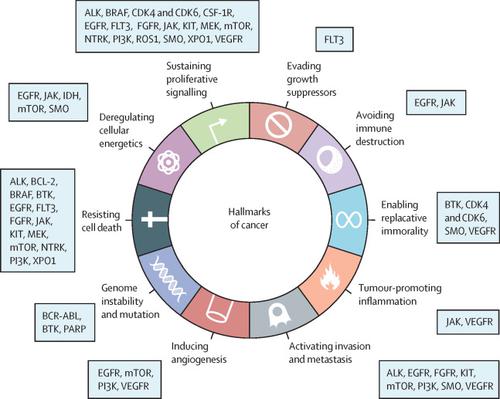Our official English website, www.x-mol.net, welcomes your
feedback! (Note: you will need to create a separate account there.)
Small molecules, big impact: 20 years of targeted therapy in oncology
The Lancet ( IF 98.4 ) Pub Date : 2020-03-28 , DOI: 10.1016/s0140-6736(20)30164-1 Philippe L Bedard , David M Hyman , Matthew S Davids , Lillian L Siu
The Lancet ( IF 98.4 ) Pub Date : 2020-03-28 , DOI: 10.1016/s0140-6736(20)30164-1 Philippe L Bedard , David M Hyman , Matthew S Davids , Lillian L Siu

|
The identification of molecular targets and the growing knowledge of their cellular functions have led to the development of small molecule inhibitors as a major therapeutic class for cancer treatment. Both multitargeted and highly selective kinase inhibitors are used for the treatment of advanced treatment-resistant cancers, and many have also achieved regulatory approval for early clinical settings as adjuvant therapies or as first-line options for recurrent or metastatic disease. Lessons learned from the development of these agents can accelerate the development of next-generation inhibitors to optimise the therapeutic index, overcome drug resistance, and establish combination therapies. The future of small molecule inhibitors is promising as there is the potential to investigate novel difficult-to-drug targets, to apply predictive non-clinical models to select promising drug candidates for human evaluation, and to use dynamic clinical trial interventions with liquid biopsies to deliver precision medicine.
中文翻译:

小分子,大影响:肿瘤靶向治疗20年
分子靶标的鉴定及其对细胞功能的日益了解,导致了小分子抑制剂作为癌症治疗的主要治疗类别的发展。多靶点激酶抑制剂和高选择性激酶抑制剂都可用于治疗晚期耐药性癌症,并且许多药物也已获得监管部门的批准,可作为辅助疗法或复发或转移性疾病的一线选择,用于早期临床环境。从这些药物的开发中汲取的经验教训可以加快下一代抑制剂的开发,以优化治疗指标,克服耐药性并建立联合疗法。小分子抑制剂的未来前景广阔,因为它有可能研究新的难药物靶标,
更新日期:2020-03-27
中文翻译:

小分子,大影响:肿瘤靶向治疗20年
分子靶标的鉴定及其对细胞功能的日益了解,导致了小分子抑制剂作为癌症治疗的主要治疗类别的发展。多靶点激酶抑制剂和高选择性激酶抑制剂都可用于治疗晚期耐药性癌症,并且许多药物也已获得监管部门的批准,可作为辅助疗法或复发或转移性疾病的一线选择,用于早期临床环境。从这些药物的开发中汲取的经验教训可以加快下一代抑制剂的开发,以优化治疗指标,克服耐药性并建立联合疗法。小分子抑制剂的未来前景广阔,因为它有可能研究新的难药物靶标,































 京公网安备 11010802027423号
京公网安备 11010802027423号